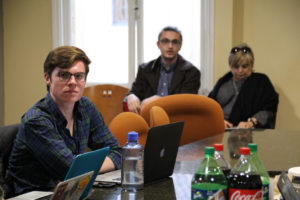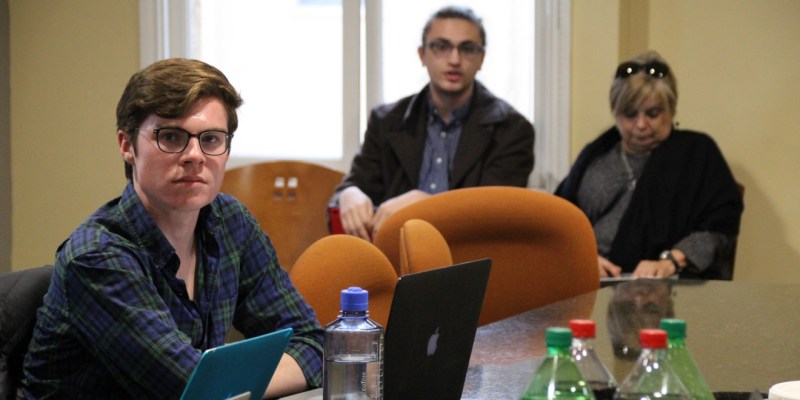
In its third meeting on Tuesday night, the 19th Undergraduate Senate continued discussions on Stanford’s long-range planning initiative, potential methods to audit Volunteer Student Organizations (VSOs) that receive ASSU funds and recent Senate candidate Jacob Randolph ’19’s Constitutional Council case against the Senate. Though individual senators voiced ideas regarding future bills, the Senate neither considered nor voted on formal legislation.
Long-range planning
On Tuesday morning, ASSU Executives Justice Tention ’18 and Vicki Niu ’18 presented to the community steering group established as part of Stanford’s long-range planning effort, which aims to make broad, institutional changes over the next 10 to 15 years. Tention, who briefed the Senate on the presentation, said that he and Niu focused on issues and ideas most pertinent to Stanford students, namely regarding student groups, residential life and supporting a diverse and safe community.
The executives advocated creating more space on campus for student groups to meet, increasing support systems surrounding wellbeing in residential life, adopting a need-blind admission policy for international students and improving housing for graduate students, among other proposals.
Tention elaborated that while the executives’ presentation addressed such issues abstractly, Tention and Niu will soon submit a proposal to the steering committee on behalf of the ASSU. That proposal, Tention said, will include “more granular detail and information with data on each of these different issues.” He welcomed input from senators as he continues to draft the proposal.
“[The community committee] seemed very receptive to our ideas,” Tention said. “Something I hadn’t thought about is that, though there are representatives from the medical school, from Human Resources and other areas on campus, some people on the committee just don’t interface with students at all in their day-to-day work, so they aren’t familiar with some of the issues we face.”
Tention will continue to take part in the community steering group within the broader long-range planning project, either officially or unofficially.
Constitutional Council case
Randolph’s Constitutional Council case, filed last Monday, argues that he should replace current Senator Lizzie Ford ’20 in order to uphold ASSU bylaws. Ford was recently sworn in to replace former senator Matthew Cohen ’18, who resigned two weeks ago when he was appointed executive chief of staff. However, Ford is a freshman, and bylaws state that at least three elected senators must be upperclassmen. Randolph asserts that, as the upperclassman who received the next-highest number of votes in ASSU spring elections, he should have been sworn in over Ford.
Alternately, Ford and the Senate hold that given the ASSU Constitution’s ambiguity, the three-upperclassman provision does not stand in the case of a resignation.
Ford is in the process of drafting her respondent’s brief to Randolph’s complaint. The Constitutional Council hearing regarding this claim will take place next Monday, May 22 at 9 p.m. at Old Union Room 220, although the location is not fully confirmed.
Senate Chair Kojoh Atta ’20 and Ford will likely argue the Senate’s case at the hearing, according to Ford. Ford also clarified that numerous other senators have offered assistance in the case.
“I’m really appreciative of the support that’s been offered to me throughout this process,” she said.
Ford expressed that as Students Committee Chair, she maintains an active role on Senate as the case progresses. Currently, she is spearheading efforts to address mental health issues on campus, specifically through Counseling and Psychological Services (CAPS). Ford noted that the Senate will host CAPS Director Ron Albucher at an upcoming meeting.
“Until this process is over, of course, I’m giving my 100 percent to Senate, and I’ll do as much as I can with the time that I have,” she said.
Future VSO auditing
Gabe Rosen ’19, chair of the appropriations committee, hopes to implement an auditing system for Volunteer Student Organizations (VSOs) that receive funding from the ASSU.
Through this new system, Rosen hopes to promote financial accountability. He believes the added oversight will help increase student groups’ financial responsibility.
“The question, to be frank, isn’t whether we’re going to do this; it’s when we’re going to do this,” Rosen said. “I want to make sure we’re transparent about this and implement it properly.”
Though this auditing process could take a variety of forms, Rosen envisions a lottery system that would select certain organizations for the appropriations committee to audit out of a pool of student groups that use more than 50 percent of the annual standard grant cap. For non-community service groups, the cap is $6,000; for community service organizations, it is $7,000.
Rosen also hopes that the auditing system will exist in conjunction with the Green Events Checklist, an ASSU document that encourages VSOs to operate sustainably.
The Alpha Phi Alpha fraternity received funds for an upcoming event. Students for Alternatives to Militarism, Stanford Chinese Dance, Girls Teaching Girls to Code and the Brazilian Students Association received funding for organizational activities.
Contact Courtney Douglas at ccd4 ‘at’ stanford.edu.
